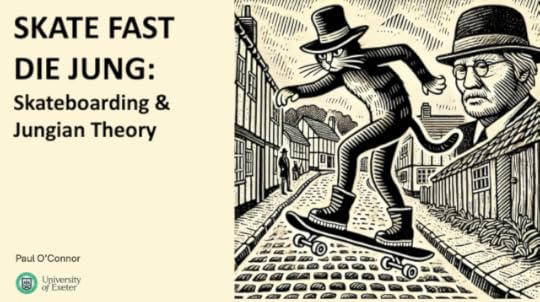New Research: Jung, Sound and a boom in skate academia

 New Research: Jung, Sound and a boom in skate academia
New Research: Jung, Sound and a boom in skate academiaThe end of the 2024 and the start of 2025 coincided with the publication of two pieces of my research. The first, an article on tackling conceptual problems in skateboarding using Jungian philosophy was a personal odyssey. I’ve been reading Jung for the past 18 months. Initially this was a personal interest for fun trying to work out some ontological questions. Then I realised it was speaking to some impasse in my research. I sat down one Saturday in August and wrote a paper on Jung over the course of two days. Quite a remarkable experience where all the ideas and notes I had just flooded out. I sent the paper off to the journal ‘Sports, Ethics, and Philosophy’ and it went through review very smoothly and was Published at the end of November. This is a quick turn around in academia.
By contrast the collaborative paper on 'the skater’s ear’ comes form research dating back to 2022. The final paper was drafted in October 2023 and it was finally published January 2025. This paper twists the notion of ’the skater’s eye’ to the notion of sound and how skaters hear their environment. It is a fun piece of work that draws heavily from very focussed interviews that wrestled with what the experience and meaning of sound is.
It is a good feeling to have two vibrant pieces of work come out so close together. However, this is all part of a much more interesting dynamic. Frequent co-author Brian Glenney released his annual review of skateboarding studies in Farran Golding’s the newly minted Skate Bylines. This is a remarkable document giving an overview of all academic work in skateboarding over the last year. It shows that there is enormous interest and a diverse array of work in this realm. There are conferences, edited collections, special issues…
It seems Brian has his work cut out for the next installment as another co-author and collaborator Sander Holsgens has just published an edited collection of new work with Adelina Ong. Skate / Worlds has some incredibly original work that looks at varied skate scenes, including social enterprises, the Bryggeriet Skate school, and Gestalt therapy. It is open access and free to download, but as I have found downloading it is much easier that actually putting it down.
Skaters often talk about how much good video content there is - too much. It is hard to keep up and see everything. It is also hard to give everything you do watch the focus that used to be the hallmark of VHS releases.
Skate writing has now entered that phase and Farran’s Skate Bylines is a huge help in this regard. My weekly staple has to be Cole Nowicki’s Simple Magic. Then there are all the podcasts to catch up on. There is so much that I have sought to post less and less on social media. My return to Tumblr is mostly a journalling process today. A punctuation mark in thoughts and reflections.
So, on to the the Jung paper and the notion of the Trickster archetype. My favourite example of the Trickster is 'Puss in Boots’ a bizarre tale of a mercurial talking cat that simply wants to furnish his hard of luck owner with wealth and status. The cat is absurd and yet full of cunning and magic. Other Trickster’s in popular culture have the same farcical conceit, they are a joke (Bart Simpson, Deadpool, Harley Quinn, Jack Sparrow, Loki, Willy Wonka, Scheherazade…) but also transformative characters that teeter on the edge of chaos and transcendence. We are always wondering are they a fool, hero or a god.

I was able to present my work on Jung and Skateboarding to the University SAC student society. It was my first time talking about the topic as I had only really read and written up to this point. I felt somewhat of a trickster forging these links. But the students came up with the name for the talk 'Skate Fast Die Jung’ which was comical too. I also now realise that the trickster was present when I did the sound research. More than in any other interviews I had ever conducted, I was deliberately confrontational, playing devil’s advocate, concealing some information and gradually letting more be known as our conversations developed. It was a deliberate intent as I knew that the type of information I needed (reflections on sound) were quite abstract and needed a series of prompts and stimulus to uncover. Most of the people interviewed expressed some curiosity like 'how are we going to talk about this?’
Just as writing about skateboarding can be a difficult as trying to land a trick, figuring out how to research it comes with its own set of complications. But recent publications demonstrate quite clearly that folk are working that out.



